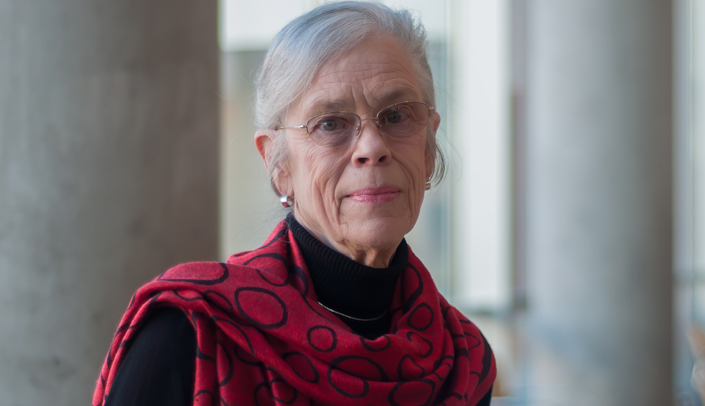Lois Norris signed on for a three-year term as a community volunteer for the Institutional Review Board (IRB).
Thirty years later, her tenure on the IRB ended.
On April 21, Norris will become the first recipient of the Community Service to Research Award, in recognition of her work with the IRB as a community volunteer. In her time, she estimates that she attended between 400 and 500 IRB meetings. She jetted to Washington, D.C. to sit on President Clinton’s Advisory Committee on Human Radiation Experiments. She learned a lot more about research and science than she’d ever known before.
“I found it was as rewarding as it was time consuming,” Norris said.
The award, which will be given annually, recognizes a community member who has contributed significantly to research.
Her long commitment to UNMC’s IRB makes Norris the perfect recipient for the inaugural award, said Jennifer Larsen, M.D., vice chancellor for research.
“For three decades, Lois has been an integral part of UNMC’s IRB process,” Dr. Larsen said. “As she steps down, we are pleased to be able to recognize her dedication and commitment to research and to UNMC.”
Ernest Prentice, Ph.D., associate vice chancellor for academic affairs, also praised Norris for her remarkable commitment. He characterized her as “an exemplary community representative who was all that an IRB member should be who represents the community.
“Our research subjects, our investigators and the institution are fortunate to have had Lois on the IRB. We will miss her,” Dr. Prentice said.
When she first joined the IRB in 1983, Norris didn’t know much about the regulations for the protection of patients and others who participate in research.
“Most of what I learned, I learned over a period of years,” she said.
For Norris, a key part of her job was reviewing the protocols to ensure that informed consent was given — that the subjects completely understood what they were signing on for and that the consent forms were accurate and consistent with the protocols.
When she resigned at the end of 2013, she had passed the 30-year mark, a point at which she’d long ago decided she would leave.
“It’s just time for me to go,” she said.
Her work in support of UNMC research has always given her a feeling of satisfaction, of contributing to the efforts of the researchers, she said.
“And I learned a lot from it.”
